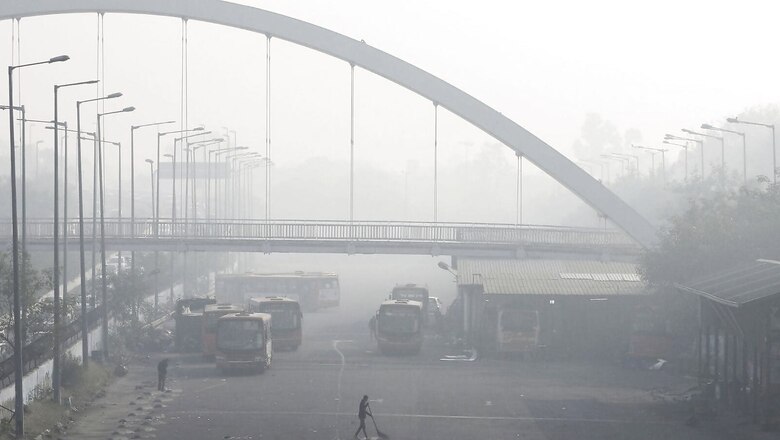Delhi Likely to Be in Grip of Smog in Next 3 Days, Punjab Fails to Douse Farm Fires; GRAP 2 Enforced

views
Air pollution levels across the National Capital Region (NCR) are expected to deteriorate in the coming three days, compelling the Commission for Air Quality Management in NCR & Adjoining Areas (CAQM) to enforce Stage-2 of the Graded Response Action Plan (GRAP) in Delhi with immediate effect.
The Air Quality Index (AQI) currently remains at the lower end of the ‘Poor’ category with fine particles (size < 2.5 micrometre) contributing nearly 42% to PM10. However, as per the early warning forecast issued by the Indian Institute of Tropical Meteorology (IITM), Pune, it is most likely to cross the 300-mark (Very Poor) levels on October 22. Starting Wednesday, a 12-point action plan under Stage 2 would be applicable in the entire NCR, which will include steps to be implemented by the Pollution Control Boards of the region and Delhi Pollution Control Committee (DPCC).
Action taken by Punjab ‘inadequate’
With farm fires gradually rising over the northern states, environment minister Bhupender Yadav said the Punjab government has not been able to take coordinated actions to contain stubble burning.
The state was provided with sufficient number of equipment and farm machinery under Crop Residue Management (CRM), and adequate funds, yet there has not been sufficient progress in the implementation of the action plan, said Yadav during the inter-ministerial meeting held on Wednesday to discuss the action being taken to control stubble burning.
With no abatement in stubble burning incidents, CAQM said it had prepared a detailed framework for in-situ and ex-situ management of the leftover straw (parali) which the states were advised to implement. “Despite several meetings and efforts by CAQM, the steps taken by Punjab are inadequate,” the committee stated. One of the main concerns cited was the delayed delivery of CRM machines in both Punjab and Haryana.
13 hotspots identified, Sangrur one of them
While the number of stubble-burning incidents has been less this season so far compared to last year, the officials said the number has begun to rise rapidly. As many as 13 districts, nine in Punjab including Sangrur, Moga, Tarn Taran and Fatehabad, and four districts in Haryana were identified as the major contributors to stubble burning. Sangrur, incidentally is also Punjab chief minister Bhagwant Mann’s home district. The higher fire counts in border districts of Amritsar and Tarn Taran were attributed to early harvesting.
While the Haryana chief secretary said the state has reported a 55% reduction in Active Fire Events in comparison to last year, the Punjab government was also asked to achieve the same target. The Punjab chief secretary was also asked to enhance the application of Pusa decomposer and control the increasing rate of Active Fire Events, especially in Amritsar. Uttar Pradesh, on the other hand, was lauded for its positive efforts and asked to ensure maintenance of progress achieved so far in the field of parali management.
The states were directed to utilise the funds effectively and for the maintenance of the provided CRM machines, and promote the application of Pusa decomposer. The governments were also directed to ensure a coordinated ecosystem for collection, aggregation, storage, and transportation of the paddy straw for effective ex-situ management of parali, as discussed in the meeting.
GRAP 2 for next 3 days
In order to control the situation from worsening further, Stage 2 of the Graded Response Action Plan (GRAP) has been enforced in addition to the restrictive measures already imposed under Stage-1. Under GRAP 2, daily mechanical/vacuum-based sweeping of roads would be carried out along with water sprinkling and use of dust suppressants (at least every alternate day) in hotspots, heavy traffic corridors, vulnerable areas and proper disposal of dust collected in designated sites/landfills. This also includes regular inspection and strict enforcement of dust control measures at C&D sites. Construction sites would be required to use anti-smog guns.
Hotels, restaurants, and open eateries have been directed to not allow coal/firewood burning including in tandoors, and ensure the use of electricity/clean fuel gas-based appliances. State governments were directed to ensure uninterrupted power supply to discourage the use of generator sets, and stop the use of diesel generators except for emergent and essential services.
Read all the Latest News India and Breaking News here


















Comments
0 comment